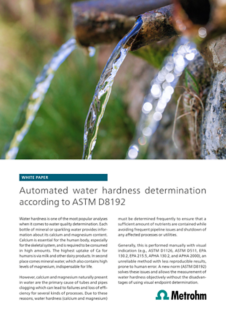ASTM D8192: Automated water hardness determination
en
The norm ASTM D8192 presents automated photometric titration for water hardness determination. A free white paper describes the determination of total, calcium, and magnesium hardness using the optical sensor Optrode from Metrohm for more reliable, accurate, and precise measurements compared to manual titrations.
Water hardness is one of the most popular analyses when it comes to water quality determination, being important for both human health and industrial productivity.
Until now, various national and international norms described the analysis of water hardness by manual titration with visual endpoint determination. This subjective technique is prone to human errors and can lead to less accurate and reproducible results. The new norm ASTM D8192 presents how water hardness (total, calcium, and magnesium hardness) can be determined by photometric titration with an optical sensor for objective endpoint determination.
Automated water hardness determination:
Advantages of new ASTM D8192
- Robust: reliable endpoint detection even in colored samples for accurate and reproducible results
- Optrode sensor from Metrohm: low detection limits and integration in automated systems for high-throughput analysis
- Maintenance-free: simple rinsing of the sensor prior to the measurement is sufficient
Learn more about ASTM D8192
The Optrode: Making the slightest color change visible
The Optrode from Metrohm is a sensor for photometric titrations. The sensor detects slight color changes by determining the change in absorbance of the sample at a specific wavelength. It then converts the absorption into a measurable potential.
The objective results obtained with an Optrode are more accurate and precise compared to visual endpoint determinations carried out by laboratory analysts.
Application note: Total, calcium, and magnesium hardness in water samples
Flyer: Water hardness by photometric titration as per ASTM D8192 (8.000.5461, PDF, 233 KB)
